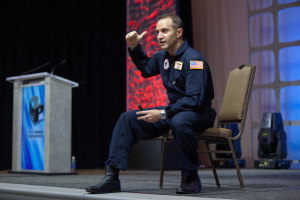My wingman screamed over the radio “Break Right, Break Right! Missile launch your 3 O’clock!”
I looked to my right and saw two SAM’s (surface to air missiles) skyrocketing towards my aircraft at twice the speed of sound. If I didn’t maneuver my aircraft immediately, I would get shot down. There was no time to think.
I lowered the nose, went to full power, banked the aircraft aggressively to the right and performed my best missile defense maneuver. Then I heard my wingman (call sign “Pigpen”) yell “Magnum” over the radio. This meant he was shooting an anti-radiation missile at the radar site that was tracking on me! Within several seconds my radar turned off and the missiles lost track of my aircraft and exploded only a ½ mile away from me! I survived.
Pigpen was my wingman over the skies of Yugoslavia that night and he possibly saved my life. His job on this mission (and every mission) was to provide mutual support to the formation. How did I know this? Because on every mission fighter pilots back each other up and cross check our most vulnerable position – directly behind us. It’s where most of the threats come from. We call it the “six o’clock” position and when we’re strapped into the cramped cockpit of the F-16, it’s the location we can’t see on our own.
Fighter pilots train in an environment of mutual support and always check each other’s six for the unseen threat. And when our wingmen call out break right to avoid the missiles, we never question their judgment. We act because we trust each other. We act because this is what we’re trained to do.
We survive solo, but win together.
In the heat of battle in business, it’s easy to get channelized and blow off your cross check (i.e. sales processes, budget, customer courtesies, critical appointments, etc.) You may be way too focused on the task at hand, overwhelmed, or stressed out. You become what fighter pilots call “task saturated.”
When this happens, it becomes easy to lose sight of the big picture and your cross check can suffer. This is when you leave yourself vulnerable to the unseen enemy and can get shot down (i.e. lose the sale, alienate a co-worker, miss a critical appointment, etc). To avoid this, you need your wingmen to provide mutual support during these stressful times.
Here are five WingTips to facilitate a check six culture in your organization.
Start by asking others for 1-1 intimate feedback on your performance:
In fast-paced, high-risk environments, close coordination is required among team members to accomplish a mission and avoid errors. Creating a check six environment with your wingmen is critical to mitigate risk and ensure the missiles of adversity, change and fear don’t shoot you down. It also helps to break down communication barriers so that all members of a team feel empowered to speak up, ask questions, and call out missiles.
The result? Team members become more trusting and engaged while leaders benefit from the improved flow of vital information up and down the organizational hierarchy. Your customers and prospects will also see a big difference in the quality of their service. Finally, having an extra set of eyes looking out for you (like “Pigpen” did for me) will allow you to function more productively and with less stress during those challenging missions.
Waldo